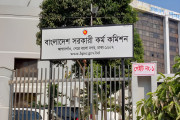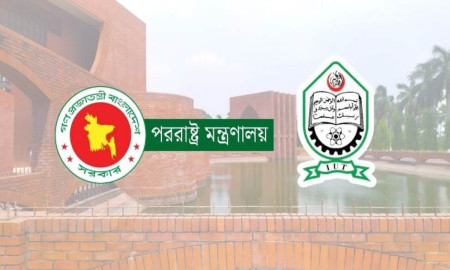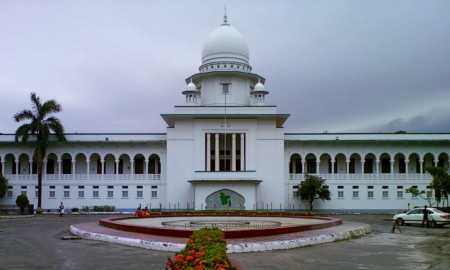BUET, RUET Graduates Bypassed, Barishal University VC’s Daughter Appointed

Allegations of nepotism and serious irregularities have emerged in the recruitment process for a lecturer position in the Civil Engineering Department at Bangabandhu Sheikh Mujibur Rahman Science and Technology University (BSMRSTU) in Gopalganj. Instead of appointing graduates from top-tier public universities such as BUET, KUET, or RUET, the department recently hired a graduate from a private university as a lecturer.
The appointee, Aohona Arefin, is the daughter of Professor Dr Md Sadequl Arefin, Vice-Chancellor of Barisal University. Aohona, a civil engineering graduate from Bangladesh Army University of Engineering and Technology, a private university in Natore, has sparked widespread criticism at BSMRSTU. Faculty and students have expressed strong dissatisfaction over the appointment.
According to sources, the Civil Engineering Department recently conducted a recruitment board meeting for lecturer positions. A total of 16 candidates, including graduates from BUET and other leading public universities, applied for three vacant posts. However, the selection board found Aohona Arefin, a private university graduate, suitable for the role. Ultimately, only two candidates were appointed as lecturers, including Aohona and a KUET graduate, leaving one post unfilled.
It is known that Aohona Arefin is the daughter of Barisal University’s Vice-Chancellor, Professor Dr. Md. Sadequl Arefin. After completing her undergraduate degree, she briefly worked as a part-time lecturer at Presidency University, a private institution, and as a teaching and research assistant at Stamford University Bangladesh.
There are allegations that, despite more qualified candidates being available, Aohona secured the lecturer position in the Civil Engineering Department solely because she is the daughter of Barisal University’s Vice-Chancellor. Her appointment was approved during the university’s latest Regents Board meeting on February 5. Notably, she received her appointment letter from the Registrar and joined the university before the Regent Board’s minutes were officially signed.
This appointment has triggered a wave of criticism on social media, with BSMRSTU students voicing their concerns. The issue has also fueled debates in university-related Facebook groups, pitting public university graduates against those from private institutions.
A student, Mahmud R. Turaj, wrote on Facebook, “One can study at a private university and still become a lecturer at our university, while our university’s gold medalists wander from door to door.”
Another student, Rathindranath Bappy, commented, “What a legendary assembly of vice-chancellors! Some favour relatives, others colleagues. Getting a job at a university now seems to require being a vice-chancellor’s kin.”
Multiple BSMRSTU faculty members stated that appointing a graduate from a third- or fourth-tier private university, while overlooking candidates from established public universities like BUET, KUET, or RUET, is shameful for the faculty and students of a public university. They suggested that such a decision might indicate ulterior motives, posing a bad omen for the institution.
They further noted that such an appointment could only occur due to political interference or the influence of powerful individuals. Additionally, some private universities have a negative reputation, with allegations of selling certificates. Thus, appointing a private university graduate as a public university lecturer is highly disappointing.
Dr. Abu Saleh, General Secretary of the BSMRSTU Teachers’ Association, said, “A university is a center of excellence, and I believe the best candidates should be appointed. If a candidate has academic excellence and experience, their private university background should not be an issue. I believe the academic selection committee and Regent Board considered these factors in making the appointment.”
Dr. Md. Kamruzzaman, President of the Teachers’ Association and Head of the Civil Engineering Department, said, “When the selection board’s decision is approved by the Regent Board, we have no further comments.”
When asked about Aohona joining before the Regent Board’s minutes were signed, the university’s Registrar, Md. Morad Hossain said, “The Vice-Chancellor approved it separately.” He declined to comment further on the appointment.
However, the Vice-Chancellor of BSMRSTU and Chairman of the recruitment committee, Professor Dr. A.Q.M. Mahbub, said, “The law permits hiring graduates from government, semi-government, or private institutions. There is no rule prohibiting private university graduates. The selection board, comprising high-ranking individuals appointed by the President and the Regent Board, made the decision based on what they found appropriate. We previously appointed contract-based teachers from BUET, but they could not adjust and did not stay permanently.”
He added, “A KUET candidate answered in Bangla during the viva board despite being asked questions in English, which shows their skill level. Studying at a prestigious campus does not guarantee a candidate’s quality. If a private university graduate performs well in the viva, they can certainly be appointed.”
When asked if National University graduates could be appointed as public university lecturers, he replied, “If they have a strong CGPA, perform well in the viva board, and possess the required qualifications, why not? They can certainly be appointed. If National University graduates have good research articles, high grades, and qualifications, they will not be overlooked for public university lecturer roles.”
Addressing allegations that Aohona Arefin was appointed because she is the daughter of Barisal University’s Vice-Chancellor, he said, “She could be the child of any university’s vice-chancellor. Does that mean she is not a person? Her qualifications for the lecturer role were assessed before the appointment. If it were my child, I would not have been part of the selection board.” He further stated, “If you examine the law, there is no provision barring the appointment of a vice-chancellor’s child.”








